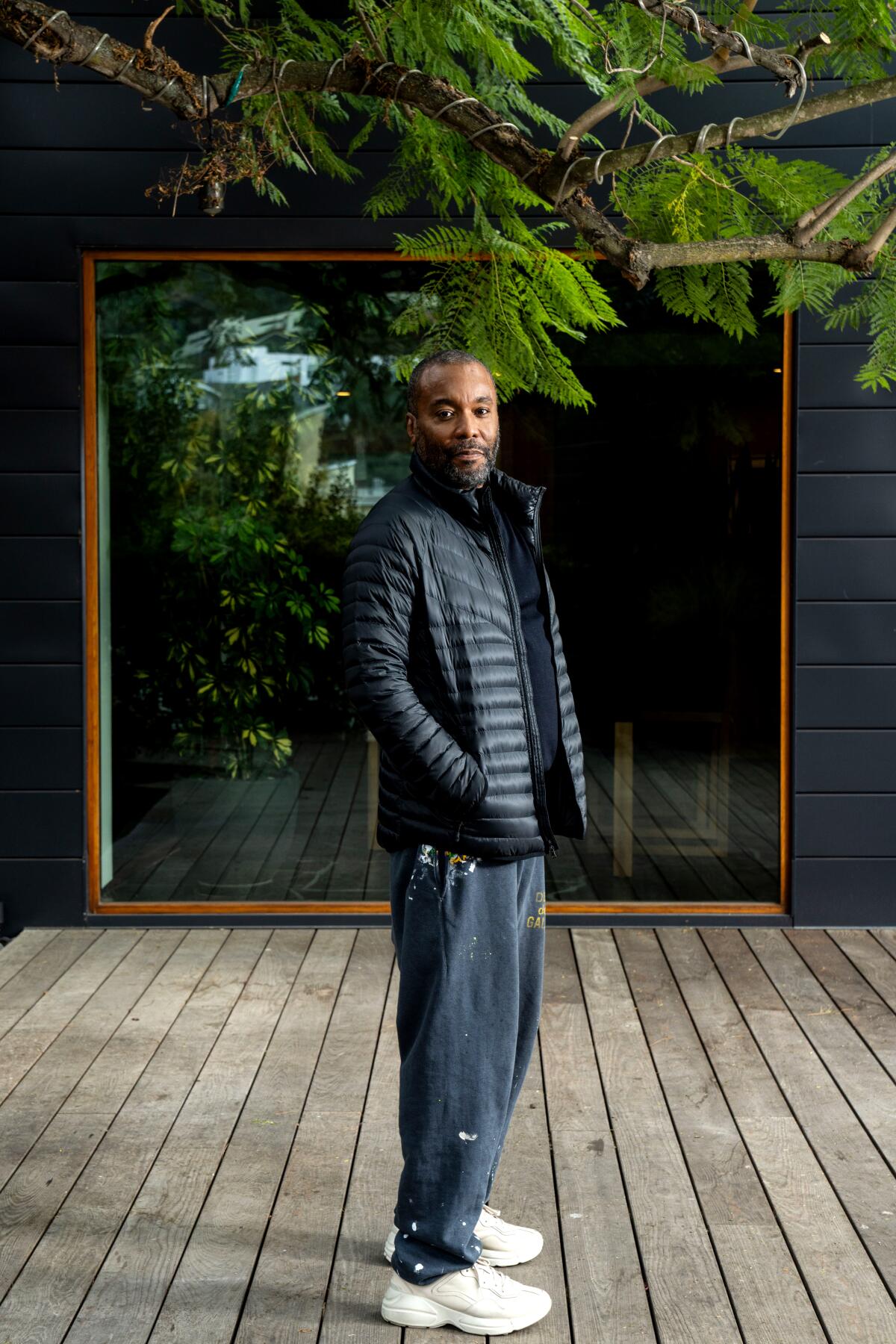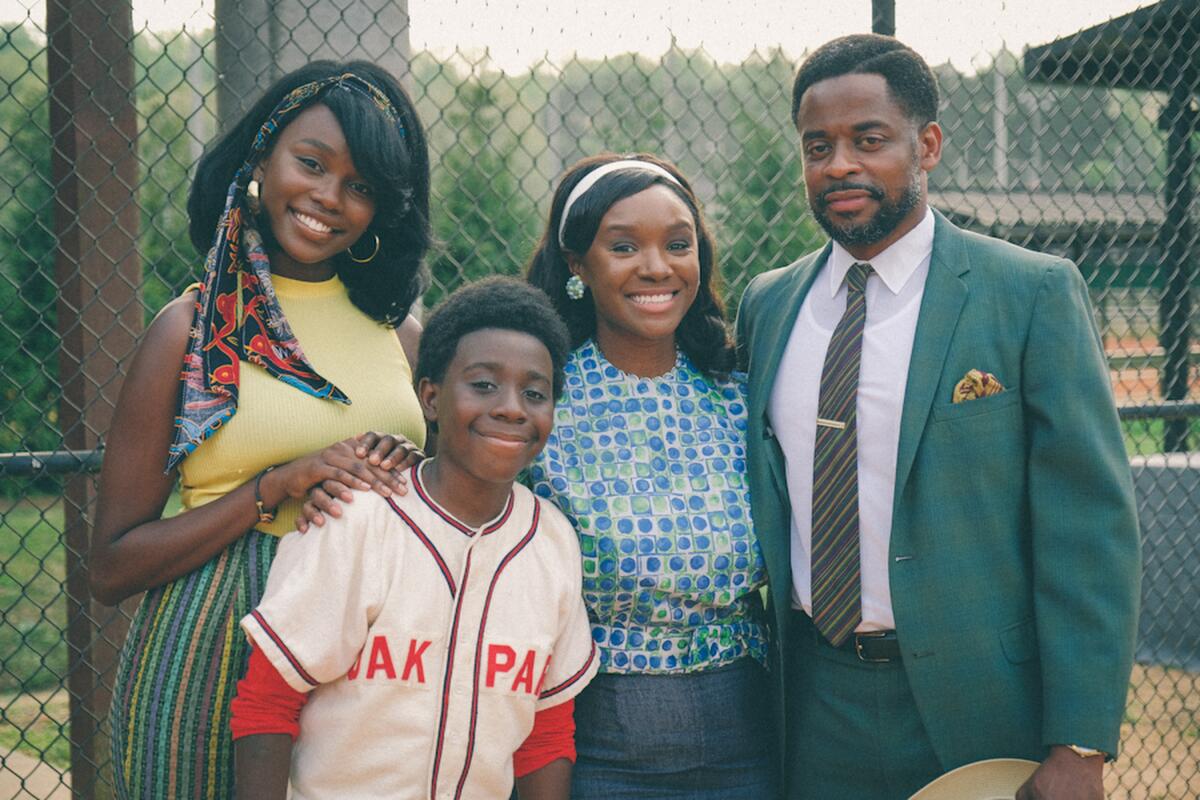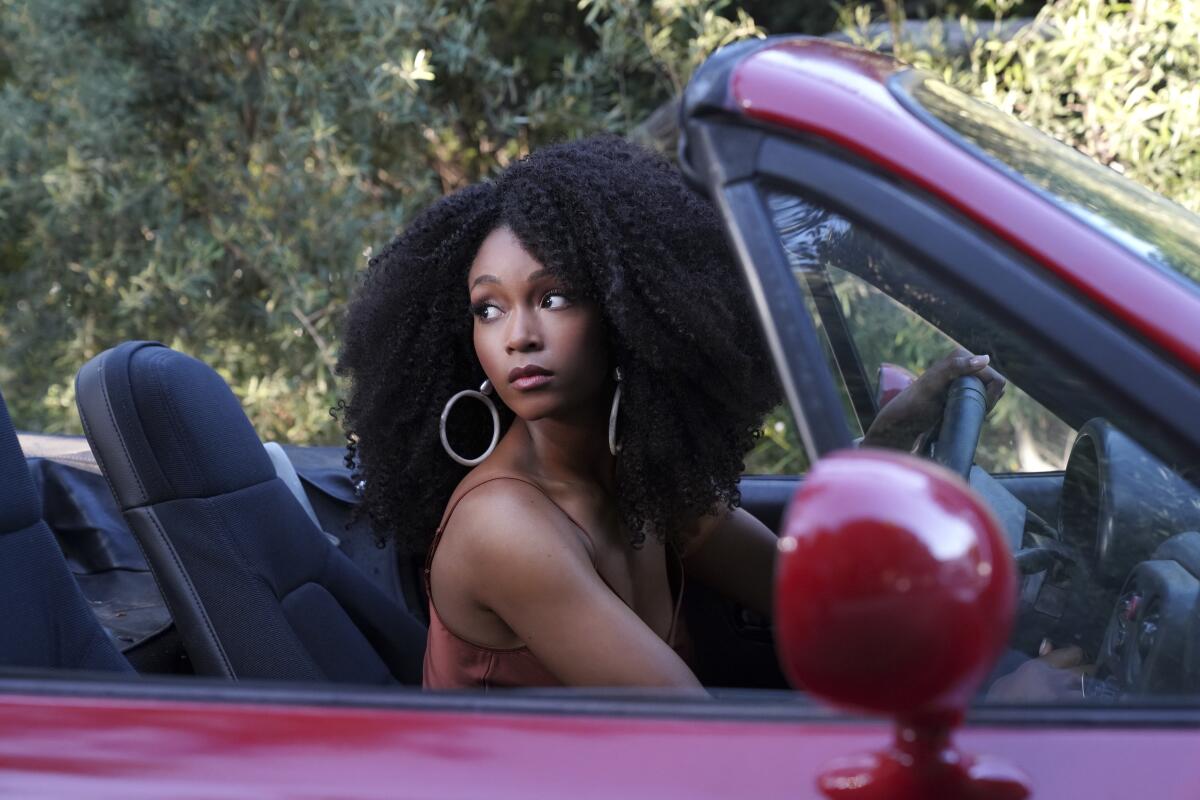Some white execs may find his work ‘too Black.’ But Lee Daniels’ empire is expanding

- Share via
If you’ve had trouble tracking down Lee Daniels in the last week or so, there’s no need to worry. He’s fine.
Less than a year after the release of his film “The United States vs. Billie Holliday,” which was a steady presence during awards season, the acclaimed filmmaker behind “Monster’s Ball,” “Precious,” “Lee Daniels’ The Butler” and the over-the-top musical drama “Empire” is taking a break. Or at least that was his plan.
“I’m a bit overwhelmed,” Daniels said last week during a Zoom interview from his Beverly Hills home. “I’m getting ready to leave for vacation where I’m just going to unplug for about 10 days. I’m not even going to turn on my phone. It’s been crazy.”
The complete guide to home viewing
Get Screen Gab for everything about the TV shows and streaming movies everyone’s talking about.
You may occasionally receive promotional content from the Los Angeles Times.
“Crazy” doesn’t come close to describing Daniels’ dizzying slate of current and future projects. Through his Lee Daniels Entertainment production company, he is executive producing three new series this fall, including a highly anticipated reboot of “The Wonder Years,” which will center on a Black family living in Montgomery, Ala., in the late 1960s. The comedy, which will air on ABC, is being directed by original “Wonder Years” star Fred Savage.
“Ms. Pat,” starring stand-up comic Patricia Williams, premiered last week on BET+ and is already winning raves from viewers. Daniels is particularly excited about the sitcom, which was passed on by Fox and Hulu before landing on the streaming service, because of the collaboration with Williams, who used to be a drug dealer and spent time in prison before reforming her life with comedy.
The show’s most diverse season might produce its first Black winner. And the alliance behind it, “The Cookout,” has sparked both anger and praise.
On the drama side, there’s Fox’s “Our Kind of People,” which centers on a wealthy Black family living in Martha’s Vineyard and likely will be flavored by the same high-energy melodrama that made “Empire” such a massive hit.
Although Daniels is not writing or directing any of the new series, he promises that all three will be marked by his usual brand of provocation and his taste for colorful characters. He’s also overjoyed to have his vision carried out by other writers and directors, many of whom worked with him on “Empire” and his other Fox drama, “Star.”
“This is a great time for my company,” he said. “I have an incredible team behind me — I’m just the figurehead. I’ve got great development people, writers, great heads that are making the trains leave the station.”
His schedule is not slowing down anytime soon. Daniels is developing a series about legendary entertainer Sammy Davis Jr. and an adaptation of the classic espionage novel “The Spook Who Sat by the Door.” Other plans include a “Cagney & Lacey”-style series featuring a gender-fluid Black cop partnered with a homophobic partner and a horror movie with “The United States vs. Billie Holliday” star Andra Day and a possible “Empire” spinoff.
Daniels spoke to The Times about his new shows, why he was too scared to write and direct any episodes of “The Wonder Years” reboot and how he is still hurt by the cancellation of “Star,” his Fox series about a female singing group that was dropped after three seasons.

Were you a fan of the original “Wonder Years”?
I loved it. I loved Fred and I loved the world. Marc [Velez, president of Lee Daniels Entertainment] said everyone was excited about Lee Daniels doing it. They wanted me to direct it. But no. I didn’t want to write it, I didn’t want to direct it. That show was so good, and I did not know how to reinterpret that world and modernize it. I didn’t want to take that chance and mess it up. I met with Saladin Patterson, who is a veteran writer, and he had a fantastic take on it.
The show will feature a Black family in the 1960s. It’s ironic to think of that as “the wonder years.”
It’s the period when I grew up. I know it so well and I don’t think we’ve ever seen a Black family from that period on a weekly basis. It’s a middle-class family. When we think of Black families of that time, we think about them being impoverished. We don’t think of “Wonder Years.” But that period was a great time for me. It will be great for America to be able to look at that time from my point of view, Saladin’s point of view.
We delve into everything “The Wonder Years” did, but from a Black perspective. And it is fascinating. We haven’t seen that before. I’m excited that Fred is overseeing the directing of it. He really gets the tone of it. I don’t have to give notes or anything.
In one scene in the pilot that impressed me, you see a couple of white kids approaching a drinking fountain, but they quickly turn away when they see a Black kid drinking out of it.
I’m telling you, Saladin and Fred Savage have it down — all the nuance.
You also seem very excited about “Ms. Pat.”
That’s a unique voice we’ve never heard, with a first-time showrunner in Jordan Cooper, who I discovered at the Public [Theater, in New York]. We were going the usual route in finding someone who could really tell Pat’s story, but they didn’t get it. Sometimes you get so beaten down by the studio system that you just write within the box. These folks didn’t know how to write outside the box. Jordan had never written anything for television before, so he didn’t know the rules at all. I brought him in on “Star” to show him how it works, and then I threw him to the wolves and had him write this show. It’s outrageous, it’s dark, and yet hysterical. It’s the first time Disney has worked with BET+.
You’ve talked about the struggle to get it on the air.
It had been kicked around at Fox and Hulu. It was too Black, too real. She’s a crack dealer who turned her life around. It’s a Black “Roseanne.” It was too real for white executives to understand.

What did they say to you? They’re not going to tell you it’s “too Black.”
They just said they didn’t get it.
Your name brand is not usually associated with comedy.
I don’t know how to do straight comedy. That’s out of my league. Both of these shows are very provocative. Pat’s show is deep, and “Wonder Years” is a very specific sort of humor. There’s some weighty stuff going down in there. It’s as much of a comedy as I can give you. Of course, when you look at “Empire,” Cookie could not have made you laugh more. A sense of irony is what I’m looking for in all of the shows that I’m working on. I want you to feel all sorts of things, even with the comedy.
Now that some time has passed, what’s your perspective of the “Empire” experience? It was such a groundbreaking show.
It’s funny. I didn’t understand what we were doing. I didn’t understand television. I thought the pilot was it, that I could go off after that and do a movie. Then they told me it was picked up: “You have to go write it.” And I said, “Write about what? What are you talking about? It killed me to do that one episode! Are you crazy?” I swear to God, I didn’t know. That’s how naive I was.
I fought hard to tell my story, and I’m really grateful to have had someone like Dana Walden [the former CEO of Fox Television, who is now chairman of entertainment at Walt Disney Television], who ultimately gave me what I wanted at the time.
Your follow-up was “Star,” about three singing sisters. You seemed upset when it was canceled.
I think it was ahead of its time, like “Empire” was. It was pre-”Pose.” I had trans and gender-fluid people on there. That’s the world I know. The critics didn’t know how to handle it. But the streets knew. Black Twitter knew. And they went crazy when it was canceled. I still get complaints about it being off the air. That hurts a lot. It was my soul. We weren’t making a statement about gays or the LGBTQ community. It was. We were.
Is it exciting to have three shows that are so different on three different platforms?
I don’t know yet until after the response, until we hear what people have to say about the shows. The tough thing for me is that I’m very hands-on. I have to learn to step back. I don’t have time to water every plant. That’s what I’m learning — stop the control. That only happens when you’re directing a film, Mr. Daniels. It ain’t about rewriting showrunners. It’s about giving them a voice and encouraging them to hopefully move in the right direction.
More to Read
The complete guide to home viewing
Get Screen Gab for everything about the TV shows and streaming movies everyone’s talking about.
You may occasionally receive promotional content from the Los Angeles Times.








